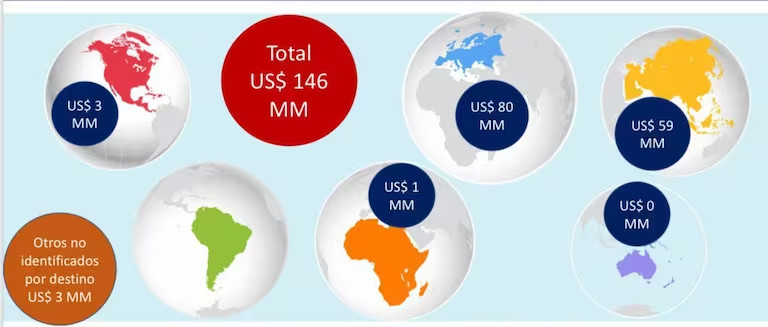|

Image: CAPeCA / FIS
'A perfect storm' put in check an activity that brings millions to the country
 (ARGENTINA, 9/12/2023)
(ARGENTINA, 9/12/2023)
The following is an excerpt from an article published by La Nación:
In the context of a drop in fishing exports in value, Eduardo Boiero, president of the Cámara de Armadores de Pesqueros y Congeladores de la Argentina (Capeca), spoke of the impact of rising costs, falling prices and obstacles to importing. supplies for ships
.jpg)
Sales by markets. Source: CAPeCA
“A perfect storm". This is how Eduardo Boiero, president of the Cámara de Armadores de Pesqueros y Congeladores de la Argentina (Capeca), describes the difficult situation faced by the Argentine fishing sector due to a combination of factors: exchange rate delay, falling prices, high costs, erratic catches. and depressed markets. According to the institution's latest report, fishing exports fell 3.6% between January and last July, totaling US$1,003 million compared to the same period in 2022.
 One of the most notable impacts was observed in the whole shrimp market, which represents approximately a third of Argentine exports. It experienced a 31.9% decrease in sales during that period and recorded an 18.4% drop in the average price per ton, standing at US$5,596 per ton. One of the most notable impacts was observed in the whole shrimp market, which represents approximately a third of Argentine exports. It experienced a 31.9% decrease in sales during that period and recorded an 18.4% drop in the average price per ton, standing at US$5,596 per ton.
Boiero indicated that the decrease in demand for shrimp was due to several factors. Firstly, in Europe there was a reduction in consumption, mainly due to inflation and rising costs, such as those related to energy. In addition, restrictive protocols were implemented in China during the pandemic that were extended until recently, making sales in that market difficult.
The Argentine shrimp is natural and wild and competes with farmed shrimp that generate large volumes of sales, which ended up affecting it. “All of these factors have led to a decline in demand and prices that have fallen below production costs,” he said.

Whole shrimp markets. Source: CAPeCA
The report showed that one of the main markets for shrimp was Spain; A decrease of 33.6% was observed in the tons exported to that destination, going from 16,111 tons the previous year to 10,705 tons in the current period. As for value, it suffered a reduction of 18% in dollars per ton, standing at $5,365.
On the other hand, exports to France decreased by 28.6%. Another market that fell was Japan, which decreased its purchases by 57.5% and the price in dollars fell 20.6%, reaching US$5,515.
.jpg)
Source: Stockfile FIS
The critical situation that the sector is going through is also explained by the economic context of Argentina. “The main costs of our activity, fuel, packaging, services in ports, stevedoring, freight, supplies, all of these items rose well above the official exchange rate. The same with the joint agreements with the different unions,” he illustrated.
He pointed out that the fishing sector was included in the dollar "agro" (a type of commodity dollar), but it did not generate the effect they expected. This while the firms passed on the improvement in the exchange rate to employees.
“We are a sector that exports about 2 billion dollars a year and we do not reach 10% of that value in inputs that we must import. “We have asked several times to be authorized to pay for imports with our currencies, but we have had no response or solution to this issue,” he added. [Continues...]
Author: Pilar Vazquez | The Nation | Read the full article by clicking the link here (only available in Spanish) (Traslated from the original in Spanish)
[email protected]
www.seafood.media
Information of the company:
|
Address:
|
Adolfo Alsina 292 Piso 7º oficina A –
|
|
City:
|
C.A.B.A.
|
|
State/ZIP:
|
Capital Federal (C1087AAB)
|
|
Country:
|
Argentina
|
|
Phone:
|
+54 11 5218-8870
|
|
Fax:
|
+54 11 1325 5275
|
|
E-Mail:
|
[email protected]
|
|
Skype:
|
https://www.instagram.com/capecaok/
|
More about: 
|
|
|
|



